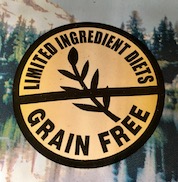grain free

VIN News Service photo
Pet foods labeled as grain-free are ubiquitous.
Contrary to a pet food company's statement, the U.S. Food and Drug Administration has come to no conclusions about the role of diet in causing the heart disease dilated cardiomyopathy in dogs.
The agency confirmed to the VIN News Service by email today that food formulations remain on the table in its investigation of ongoing cases of DCM.
"[W]hile a direct link to diet has not been identified, FDA has not eliminated diet as a potential factor," the agency said, in part.
Champion Petfoods, a Canada-based company whose brands have been implicated in cases of the disease, stated in a Nov. 5 press release that the FDA had "concluded there is no scientific evidence that a grain-free diet causes canine dilated cardiomyopathy."
Champion's two pet food brands, Acana and Orijen, were on a list released by the FDA in June 2019 of the 16 brands named most often in reports of DCM received by the agency.
DCM is a life-threatening condition in which the heart muscle weakens and cannot pump blood efficiently. A physical hallmark is enlargement of the left ventricle, the organ's main pumping chamber. Dogs with DCM may cough, struggle to breathe and lack stamina. They may collapse, faint or die suddenly.
Until recently, DCM in dogs was seen almost exclusively in breeds of dogs known to have a genetic predisposition to the disease, such as Doberman pinschers, Great Danes, Irish wolfhounds, boxers and cocker spaniels.
Starting around 2015, the FDA began receiving reports of DCM in dogs of other breeds. Rising numbers of reported cases led the agency in 2018 to call the public's attention to the issue. A common thread in many of the cases was that the affected animals ate grain-free formulations of pet food.
Since then, the FDA and the broader veterinary research community have been trying to determine whether diet is the root of the problem and if so, in what way. Meanwhile, cases reported to the FDA — mostly involving dogs, plus a small number of cats — topped 1,100 as of July.
During a scientific conference on the topic, held virtually on Sept. 29 and hosted by Kansas State University, Dr. Steven Solomon, director of the FDA's Center for Veterinary Medicine, summarized the agency's findings to date.
In examining diet histories of affected dogs, he said, investigators found that "more than 90% of products, according to their labels or label ingredients, were 'grain-free.' These products did not contain corn, soy, wheat, rice, barley, or other grains. Ninety-three percent of reported products had what appeared from the ingredient panel to be high proportions of peas or lentils or both. A small percent of reported products contained potatoes, including sweet potatoes, in the ingredient list.
"A pattern emerged," he continued. "Dogs in cases submitted to FDA were reported to have consumed diets containing high proportions of pulse ingredients, which are dried legume seeds, including peas, chickpeas and lentils. ... Again, many of these diets were labeled as 'grain-free,' and they didn't contain corn, wheat or other traditional pet food grain ingredients. Our scientists took note of this pattern with the ingredients without a determined cause and effect."
Solomon went on to note that "pulse ingredients have been used in pet food for a long time" but that those used in "grain-free" diets are found "in greater proportion than in grain-containing formulas, which means there is an area to investigate further."
On Nov. 3, the FDA posted a link on its website to Solomon's remarks and other presentations from the conference.
Champion Petfoods references that FDA update in its press release, which is titled in part, "Evidence finds no causal relationship to grain-free food."
In response to the VIN News request to clarify its stance, the FDA said today: "It is clear that this is a complex, multi-factorial scientific issue, and that, while a direct link to diet has not been identified, FDA has not eliminated diet as a potential factor. As the scientific community looks further into the role that diet may play in these cases, we hope to explore additional avenues about ingredient levels, nutrient bioavailability, ingredient sourcing, and diet processing to determine if there are any common factors."
The agency also noted that diets high in pulses and associated with DCM cases are grain-containing as well as grain-free.
The FDA said it has asked pet food manufacturers to share their formulations so that researchers can better examine the possible role of ingredient proportions.
Informed about the FDA's comment today, Champion Petfoods provided this written statement from Jeff Johnston, senior vice president for research, innovation and product development:
"We agree that DCM is a complex medical condition that may be affected by the interplay of multiple factors, including genetics, the dog's underlying medical condition and diet. However, the FDA has not taken regulatory action against or declared any specific pet food products unsafe or definitively linked to DCM. The FDA has said that legumes, including pulse ingredients, have been used for many years with no evidence to indicate they are inherently dangerous and that the agency has no definitive information indicating that grain-free diets are inherently unsafe."
Johnston said the company will not share its specific formulations "because they're proprietary."
Dr. Mark Peterson, a general practitioner in Tacoma, Washington, remarked on a message board of the Veterinary Information Network, an online community for the profession, that the press release by Champion Petfoods claiming that grain-free diets are absolved "makes me highly suspect of their company and makes me not want to recommend their products. So their actions are self-defeating."
In an interview by email, Peterson said, "Until we know for certain, I prefer to err on the side of caution and not feed these diets. No pet needs to be fed these diets, so I don't see any harm in feeding something else until it is figured out."